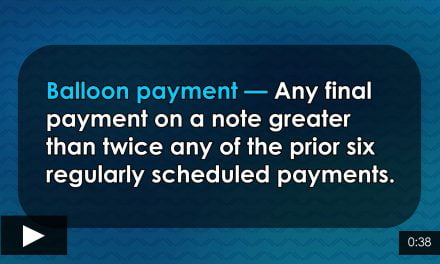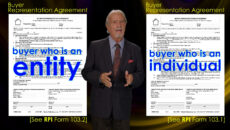Structuring a marketing package is a key component of listing a property. Read on for details about the contents, costs and delivery of a marketing package prepared by a seller’s agent.
Coordinating events favoring fairness
When employed as a seller’s agent, you owe a special fiduciary duty to the seller to diligently market their listed property for sale. The sole objective: solicit and locate prospective buyers ready, willing and able to acquire the property on the listed terms.
In turn, when a prospective buyer is located, you owe the prospective buyer and their agent a general duty to voluntarily and promptly provide critical information on the listed property. Thus, they will have enough awareness of the property’s condition to set a price and make an offer. The property information you disclose need only be sufficient to place the buyer on notice of facts which may have an adverse effect on the property’s value or interfere with the buyer’s intended use. Advice about the meaning and consequences of the disclosures is the fiduciary duty of the buyer’s agent, or the buyer to protect themselves when the buyer is not represented by an agent.
For the easiest delivery of property information, you organize the information you gather at the listing stage into a marketing package.
A marketing package is a collection of property information and data handed to prospective buyers for their review when they request more information on a listed property beyond the contents of a promotional flyer. The package contains critical information about the property known or available to you or your seller. Included are all required property disclosures and any third-party investigative reports acquired regarding the property’s present condition.
The more information you present in a marketing package, the more confident the buyer becomes about the property’s profile. On delivery of the package, the prospective buyer knows the knowable information — and the status of the property is affirmed so a transaction can be arranged.
When properly marketing a property, delivery of the marketing package is part of your due diligence requirements owed to your seller. Disclosures avoid claims of fraud after your seller enters into a purchase agreement with a buyer. Property disclosures provided to buyers containing third-party reports reduce:
- the owner’s exposure to liability under their duty to disclose their knowledge of the property’s condition to prospective buyers before contracting [Calif. Civil Code §1102.4]; and
- your exposure to liability as the owner’s agent under your duty to personally inspect, observe and timely report your findings to prospective buyers about the property’s condition. [CC §2079]
Contents of a perfected marketing package
A checklist of the contents of the marketing package is reviewed with your seller when you enter into a listing agreement. [See RPI Form 102 §7]
The checklist addendum to the listing agreement is called the advance cost sheet. Among other costs of a sale, it is your estimate of the cost of third-party investigative reports to be included in the marketing package you will hand to buyers. [See RPI Form 107]
Once the seller reviews and agrees to incur the marketing expenses itemized in the cost sheet, you have authority to request the various third-party services and reports for inclusion in your marketing package.
The recommended third-party reports to be included in the marketing package are:
- an occupancy (transfer) certificate (when required by local ordinance);
- a Natural Hazard Disclosure Statement (NHD), provided by an NHD expert [See RPI Form 314];
- a structural pest control report (SPC) and any clearance;
- a home inspection report (HIR) to accompany property disclosures;
- a well water report, if applicable; and
- a septic tank report, if applicable.
Along with the third-party reports, your marketing package will also include various property disclosures, such as:
- a Transfer Disclosure Statement (TDS), the disclosure of the physical condition of the property [See RPI Form 304];
- a Natural Hazard Disclosure Statement (NHD), if not obtained from an NHD expert, regarding natural hazards due to the geographic location of the property [See RPI Form 314];
- a Lead-Based Paint Disclosure (LBP), required on all pre-1978 residential construction [See RPI Form 313];
- Federal Residency Declarations, also known as the Foreign Investment in Real Estate Tax Act (FIRPTA), confirming the seller’s legal status for tax purposes when closing escrow [See RPI Form 301];
- a Residential Earthquake Hazards Report, disclosing structural weaknesses for properties built prior to 1960 [See RPI Form 315];
- the multiple listing service (MLS) printout and property profile;
- a Seller’s Neighborhood Security Disclosure, relating to security conditions in and around the property [See RPI Form 321];
- any common interest development (CID) documents, if applicable;
- a local ordinance compliance report, disclosing the property’s compliance with city and county ordinances [See RPI Form 307];
- an Annual Property Operating Data Sheet (APOD), disclosing the costs of operating the property and any rental income [See RPI Form 352, 562 and 318]; and
- a rental income spreadsheet, regarding the rent roll for income property, if applicable. [See RPI Form 352-1]
All property information—third-party reports and disclosures you prepare — is included in the marketing package you hand to prospective buyers or their agents when they ask for more information or otherwise indicate they may submit a purchase agreement offer for the seller to consider. However, when a marketing package is delivered to the buyer after the seller accepts the buyer’s offer, the disclosures are untimely and rather meaningless for setting the price agreed to. Prospective buyers need the fundamental property information in marketing package disclosures to make decisions about the value of the property and distinguish it from other properties they are considering.
To ensure your timely delivery of the marketing package, simply hand the marketing package to any buyer who requests more information on your seller’s listed property than provided by a promotional flyer.
Negotiating costs with the seller
Collecting information and reports on a property involve costs you need to discuss with your seller. [See RPI Form 107]
Remember: with the delivery of the reports, a prospective buyer will be entering into a purchase agreement and acquiring the property based on their full knowledge of the property’s condition. Availability of the disclosures provides the seller with a competitive sales advantage over owners of other qualified properties for sale but not marketed with reports to corroborate their condition — a benefit to remind your seller of.
The seller may choose when to incur the expense of third-party reports, either:
- at the time the seller lists the property for sale, so reports are delivered prior to the seller entering into any purchase agreement with a prospective buyer and thus limit buyer claims about the property’s condition; or
- after entering into a purchase agreement with a buyer, which may result in the buyer discovering defects previously unknown, causing them to demand the defects be eliminated by the seller before closing, request a concession in lieu of the repairs, renegotiate the purchase price, cancel the purchase agreement or close escrow and make a demand for lost value due to undisclosed defects. [Jue v. Smiser (1994) 23 CA4th 312]
Further, the seller may choose how to pay for the cost of the reports on the advance cost sheet. They may opt to pay the charges directly to the third-party vendors once billed, which you coordinate with the vendors. Or, your seller may hand you a check for delivery to the vendor when you receive a report, in which case the check constitutes trust funds to be entered on the trust fund ledger. [Calif. Business and Professions Code §10146; See RPI Form 107 §4.1]
Alternatively, the seller may make a check for the estimated cost of reports payable directly to you as their broker. You will hold the payment in a trust fund account and pay the charges from the deposit when billed by service providers. [See RPI Form 107 §3.4]
The advance cost sheet authorizes you to disburse the seller’s funds from the trust account as you incur the costs. When the listing terminates, you return all remaining trust funds to the client without offset for any fees owed to you by the seller.
Occasionally, sellers refuse to incur the cost of third-party reports needed to sell their property. However, these sellers need to consider that, on a buyer’s acquisition of reports after entering into a purchase agreement, the buyer may make a demand on the seller to eliminate defects noted in the reports by completing repairs and replacements before closing escrow. Buyer-occupants do not generally intend to purchase a defective home when they enter into a purchase agreement.
Thus, it is best for a seller to request the reports sooner at the listing stage, rather than later after contracting to sell, to create a comprehensive marketing package and avoid conflicts with the buyer and their agent.














